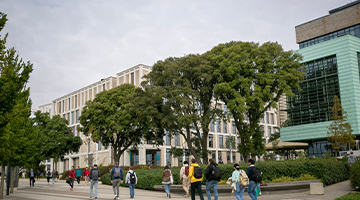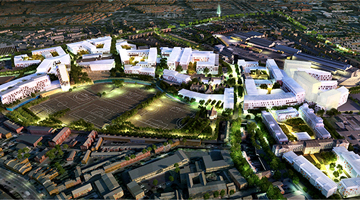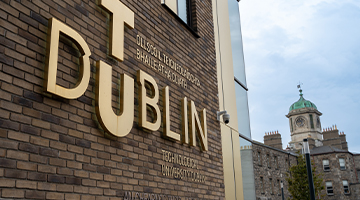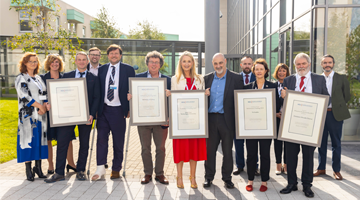Towards a Sustainable University Campus

In September 2023 Technological University Dublin was awarded one million Euro as part of the HEA’s €5.5 million in Performance Funding to five higher education institutions in recognition of their outstanding contribution to national strategic priorities and policies.
On 01 January 2024, TU Dublin officially launched the HEA funded project titled ‘Towards a Sustainable University Campus’, a major decarbonisation initiative. The project's goal is to pilot a smart monitoring and reporting infrastructure by upgrading existing monitoring and control systems and digitalising three exemplar buildings, and working with cross-sectoral stakeholders and through active user involvement transform them as living laboratories. Data will provide evidence to understand, benchmark, and optimise energy usage within a user-centric approach to enable the co-creation of further decarbonisation strategies.
This project contributes to the University's ongoing decarbonisation and optimisation efforts, whilst establishing and disseminating best practices for the higher education and the public sector.

Project outline
‘Towards a Sustainable University Campus’ aims to pilot a scalable digital system for energy reporting in three campus buildings which TU Dublin will retain to 2030 and beyond in accordance with the Public Sector Climate Action Mandate and TU Dublin’s Climate Action Roadmap. The three buildings will be selected by the end of Q3 2024 together with our Monitoring Action Plan (MAP), which will establish exemplars for the monitoring and optimisation of on-campus energy usage and will support teaching and training initiatives for students, staff, and the wider community. The project aligns to national climate strategy and the Sustainable Development Goals (SDG), with the potential to enhance TU Dublin’s position as a leader in sustainability within the Higher Education sector.
Current situation
To systematically and continuously report on Scope 1 and Scope 2 energy related emissions inputted in the SEAI Monitoring and Report (M&R) platform, and drive sustainability directives, TU Dublin has identified the needs to enhance overall energy and environmental management systems in its Climate Action Roadmap (CAR). The CAR forecasts greenhouse gas emissions, outlines action plans to address gaps to targets, and prepares Scope 3 initiatives. The 2016-2018 baseline reports 9,971 tCO₂ emission with an increase to 10,895 tCO₂ emission, mostly due to the addition of buildings. With on-going and planned construction it is expected that 4,077 tCO₂ will be added. To efficiently develop and implement decarbonisation programmes and meet the 2030 and 2050 net-zero target, smart digital infrastructures are essential. They also provide data to enhance all future capital plans. TU Dublin will need to quickly transition from a ‘traditional’ campus infrastructure to an ‘automated and integrated’ campus with a view to becoming an ‘intelligent campus’. Schematics below outline the projects targeted milestones.
Objectives
- Recruit roles in technical project management, exploitation, and dissemination
- Develop a detailed monitoring action plan based on the core needs to network Building Management Systems (BMS) and integrate internet-of-things (IoT) technologies for energy consumed and produced, environmental conditions, services, and occupancies.
- Pilot a smart monitoring and reporting infrastructure over three buildings with different occupancy profiles and usage.
- Benchmark the energy performance, comfort, and occupancy profiles of the three identified buildings.
- Develop energy, comfort, and occupancy models.
- Transform our buildings into interactive living labs with user-centric dashboards providing users with an understanding on their energy impacts, and potentially suggest behaviour/activity change to optimise the building operation.
- Develop initiatives to up-skill staff, educate students and the community.
Key Challenges of the Traditional Campus at TU Dublin
- Building Information Modelling (BIM) up-skilling of staff required.
- Lack buildings’ assets repositories.
- BMS do not systematically and consistently report data online.
- No IoT technology used.
- Occupancy manually monitored and approximated via Wi-Fi and Door access.
- BMS, energy and water meter points data manually collected and compared to bills.
- Meter points connected to multiple buildings.
- Data repositories and energy service platform disconnected.
- Existence of digital floor plans limited.
- Benefits/use of 3D Revit models available not understood.
Solutions to an Automated and Integrated Campus at TU Dublin – Steps toward digital twins and smart campuses
- Recruit Building Information Systems and Modelling experts to build long term capacity and knowledge.
- Form an Advisory Board leveraging expertise and develop partnerships.
- Develop, implement, pilot, and validate a sub-metering action plan.
- Connect, consolidate, and automate our data processes from the collection of data up to the generation of reports and data visualisation on dashboards.
- Acquire robust 'live data'.
- Develop a complete digital twin integrating 3D models, assets, sensors’ data and prediction models.
- Create opportunities for Education, Research & Innovation, and Engagement.
Key outputs
- Development of an investment strategy for the digitalisation of buildings and campuses of at least 1M€ per annum to decarbonise TU Dublin campuses through the funding stream such as energy performance contracts (EPC), energy savings resulting from building upgrades, fundraising, non-exchequer and non-commercial (NE-NC) funding (EU and International), national funding such as the SEAI Energy Obligation Support Scheme, collaborative partnerships with industries and industry contributions.
- Fundamental data infrastructure, acquisition, management, and processing in place to develop sustainable university campus environment.
- Report pathways to decarbonisation, to enhance data quality in TU Dublin Climate Action Roadmap.
- Report pathways to space optimisation.
- Report pathways to scale across all campus infrastructure.
Job Opportunities
Five Work Packages (WP) have been developed and will be promoted at the end of January 2024.
- WP1: Project Management
- WP2: Integrated Campus – Physical & Digital transformation
- WP3: Modelisation & Predictions
- WP4: Education & Trainings
- WP5: Exploitation and Dissemination Description of roles to recruit with associated
All roles will work closely with the Sustainability, Campus and Estates, Technology Services functions within TU Dublin, including relevant partners and agencies such as the Grangegorman Development Agency (GDA), Sustainable Energy Authority of Ireland (SEAI), and Codema. This will facilitate the project tasks and ensure the continuity of the work beyond the project period.
Project Lead: Dr. Philippe Lemarchand, Head of Sustainability Intelligence

People-Counting Sensors
People-Counting Sensors - Greenway Hub Grangegorman

coming soon
coming soon

Meet the Sustainability Intelligence Team
TU Dublin is delighted to introduce three new colleagues who have recently joined the Sustainability Intelligence Team as part of the project, Towards a Sustainable University Campus.

Strategic Selection of Pilot Buildings
Three buildings were chosen for the study that represent diverse challenges and opportunities, and it is hoped that that these buildings can act as exemplars for the digitalising of all other building stock across the university.

Towards a Sustainable University Campus Launch
TU Dublin officially launched the Higher Education Authority Performance Funding project ‘Towards a Sustainable University Campus’ on 01 January 2024

TU Dublin awarded €1m in Performance Funding
One million Euro in Performance Funding has been awarded to TU Dublin in recognition of the University’s major decarbonisation initiative
